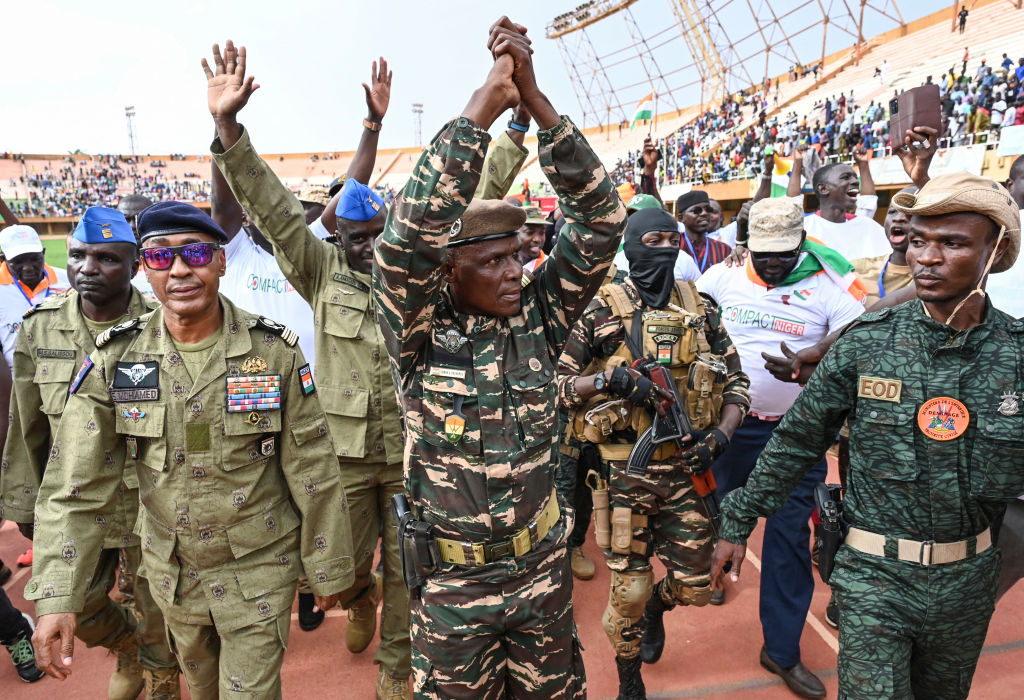Russia Exploiting Niger Coup on Social Media
ADF STAFF
In the immediate aftermath of the Niger military coup in late July, Russia’s formal and informal responses were at odds.
The Kremlin’s spokesperson called for the immediate release of detained Nigerien President Mohamed Bazoum and urged a return to order.
Wagner Group kingpin Yevgeny Prigozhin, however, offered to usher in a new order with his notorious mercenaries. In a voice recording posted to social media platform Telegram, he commended the Niger junta, denounced former colonial power France, and spread disinformation.
“After the coup in Burkina Faso in October last year, there were Telegram accounts linked to Wagner that were openly saying ‘Niger is our next target,’” Africa Center for Strategic Studies research director Joseph Siegle told the Washington Examiner newspaper.
“Russia has been interested in seeing a military takeover, which maybe provides an opportunity for them to get more influence.”
There are numerous examples and multiple reports that Russia is using traditional and social media channels to exploit the Niger coup. Using the Wagner Group as a proxy for its foreign policy objectives, the Kremlin continues to wage hybrid warfare in Africa and stoke instability.
Since the coup, Niger has been hit with waves of anti-French and pro-Russian propaganda, just as were its Sahelian neighbors Burkina Faso and Mali, which quickly leaned towards Moscow in the wake of their recent coups.
Content about Niger on 45 Telegram channels affiliated with the Wagner Group or the Russian state surged by 6,645% in the month after the coup, according to Logically, a technology company that combats online disinformation.
Some channels claimed the coup leaders were linked to Wagner. One Russian military blogger reported that the mercenary group was soon to receive an invitation from a “free” Niger.
A video circulated of a Russian military plane supposedly landing in the capital of Niger with boasts that “Wagner forces have already begun to enter the city.”
However, BBC Verify found that the video was posted on YouTube in 2006 and shows the plane landing in Sudan’s capital.
“Social media accounts quite quickly pivoted to Niger … [with] some serious issues with misattributed footage,” Logically head of research Kyle Walter told The Guardian newspaper. “There is a big audience for pro-Kremlin narratives that contradict western countries’ pro-Ukrainian narratives.”
Pro-Russian propaganda and misinformation campaigns on television, radio and social media are nothing new in Africa. At the behest of Russian President Vladimir Putin, Prigozhin played a key role in the establishment and expansion of the Kremlin’s information warfare in Africa.
But analysts observed a sharp decline in Niger content on Wagner social media channels after Prigozhin’s death in a plane crash on August 23. Without its brash, attention-seeking leader, Wagner’s future role in Russian operations in Africa is in doubt.
Stephen Blank, a senior fellow at the Foreign Policy Research Institute, said one of Russia’s primary goals on the continent is to incite, facilitate and support autocrats and military takeovers.
“One goal is to undermine if not overthrow democratic but beleaguered African governments and replace them with Russian proxies — often generals connected to Moscow through Russian arms sales if not corrupt partnerships — to foster authoritarian rule there,” he wrote for The Hill news website in an August 4 opinion piece.
“Moscow clearly exploits regional, tribal, ethnic, religious, or inter-state conflicts in Africa for its purposes. It also possesses an extensive and widely used information network that Russia deploys in tandem with its military, economic and political ties with local parties in order to promote its clients.”
In looking at the big picture of Russia’s goals in Africa, Blank believes the Kremlin’s concerted effort to flood Niger and the rest of the Sahel with misinformation is central to its established template.
Russia seeks to deploy mercenaries, sell arms and military equipment, gain control of mining operations and other natural resources, and ultimately embed operatives into governments and militaries to access the levers of power.
“The latest coup clarifies Russia’s instruments of power, tactics and goals for nations in Africa, if not, other developing states in other regions,” Blank wrote. “It also may explain why Putin did not disband Wagner after the June mutiny, because of its centrality to Russia’s global strategy.”


Comments are closed.